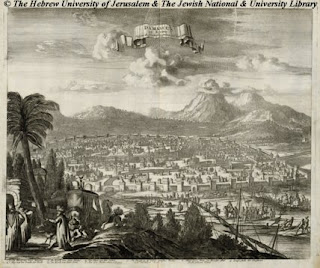"Go into the city and you will be told what to do"

This picture is of Damascus, circa 1677.
I've found it important for me to draw near to God, as work threatens to gobble up more and more of my attention. As usual and unfortunately, God always gets more attention in a crisis :p
Now, to my thoughts for this week, which are utterly plagiarised from what my wife shared with me haha :)
Acts 9:1-17 describes Saul's conversion on the road to Damascus. There are a number of interesting bits in this passage. When Saul is blinded by the light, he says "Who are you Lord (Adonai)?" (Acts 9:5). This suggests three things - one, that he doesn't know who the light is. Two, nevertheless, he knows that the light has authority. Third, he wants to know who the light is.
Saul was a busy man. He was an important man. In fact he was just on his way to Damascus to take prisoner the Christians, in a fit of self-righteousness. I'm sure that like me, you have often felt like Saul. We feel busy and important (especially at work), doing all sorts of important things that seem right to us. Then something hits us - it can be a relatively small thing or a big thing. It can be a disappointment or failure or disaster. Like Saul, if we are intent on our own busy purposes, when difficulty confronts us, we may not recognise that God is still in charge. We ask "O trouble, who are you? Why?!".
Often the thing that has hit us has significant authority or influence over us - otherwise it wouldn't be much a problem in the first place. It can be something irreversible like death, it can be financial loss, it can be a conflict with a colleague or boss. But the answer to the question "Who are you?" which we ask of the difficulty facing us, is not death, or financial loss or conflict, no matter how substantial that difficulty is. If we submit to the authority of the difficulty we are encountering, we subrogate God's own authority over us. But we know that God is in charge. So when difficult circumstances surround us, we must remember that the answer to "Who are you, Lord?" is still "God". Having recognized that the "who" is God, we have absolute assurance that His loving authority is greater than any authority that our difficulties appear to have over us.
But our capricious and sinful nature often doesn't even allow us to do this! When trouble hits us, we don't WANT to recognise that God is in charge. We want to find our own way out. Let's be wary about our own fallibility. DESIRE to know Him more. READ the Word conscientiously. SURROUND ourselves with a supportive community of believers in church and at work. PRAY continuously. PRACTISE our faith in works so that we will not be deceived by our own vast, but unapplied knowledge. DEMONSTRATE to our colleagues that God is really Lord over our lives.
Acts 9:6 goes on to say that when Jesus tells Saul who He is, the next instruction is simply "go into the city and you will be told what to do". God often leads us step by step. He tells us the next step to take, but not necessarily the ten steps after that. There may be many different reasons for this. Perhaps He doesn't want us to be frightened of what lies ahead (jail, shipwreck, trial and execution? Right, sign me up :P). Perhaps He wishes to build our faith so that we walk in complete trust. Perhaps He may even wish to give us a happy surprise - after all, happiness is often augmented by its unexpectedness :)
Romans 8:24-25 says "But hope that is seen is no hope at all. Who hopes for what he already has? But if we hope for what we do not yet have, we wait for it patiently." In fact, when Saul reached Damascus as instructed, he remained blind and received no instruction for 3 more days (Acts 9:9)! He must have wondered if he heard wrong. But God is always proved right, and not one of His promises fail. "You know with all your heart and soul that not one of all the good promises the LORD your God gave you has failed. Every promise has been fulfilled; not one has failed.' Joshua 23:14.
Today, if we have trouble or worry, especially at work (since this is after all a message to Christians in the workplace...), remember that God is in charge, and that He leads us one step at a time, in complete assurance that our destination is glorious, because "in all things God works for the good of those who love him, who have been called according to his purpose." Romans 8:28. And as we live and demonstrate to our colleagues this unshakeable and faithful God, He will certainly, "through us, spread everywhere the fragrance of the knowledge of Him" 2 Cor 2:14.
Now, to my thoughts for this week, which are utterly plagiarised from what my wife shared with me haha :)
Acts 9:1-17 describes Saul's conversion on the road to Damascus. There are a number of interesting bits in this passage. When Saul is blinded by the light, he says "Who are you Lord (Adonai)?" (Acts 9:5). This suggests three things - one, that he doesn't know who the light is. Two, nevertheless, he knows that the light has authority. Third, he wants to know who the light is.
Saul was a busy man. He was an important man. In fact he was just on his way to Damascus to take prisoner the Christians, in a fit of self-righteousness. I'm sure that like me, you have often felt like Saul. We feel busy and important (especially at work), doing all sorts of important things that seem right to us. Then something hits us - it can be a relatively small thing or a big thing. It can be a disappointment or failure or disaster. Like Saul, if we are intent on our own busy purposes, when difficulty confronts us, we may not recognise that God is still in charge. We ask "O trouble, who are you? Why?!".
Often the thing that has hit us has significant authority or influence over us - otherwise it wouldn't be much a problem in the first place. It can be something irreversible like death, it can be financial loss, it can be a conflict with a colleague or boss. But the answer to the question "Who are you?" which we ask of the difficulty facing us, is not death, or financial loss or conflict, no matter how substantial that difficulty is. If we submit to the authority of the difficulty we are encountering, we subrogate God's own authority over us. But we know that God is in charge. So when difficult circumstances surround us, we must remember that the answer to "Who are you, Lord?" is still "God". Having recognized that the "who" is God, we have absolute assurance that His loving authority is greater than any authority that our difficulties appear to have over us.
But our capricious and sinful nature often doesn't even allow us to do this! When trouble hits us, we don't WANT to recognise that God is in charge. We want to find our own way out. Let's be wary about our own fallibility. DESIRE to know Him more. READ the Word conscientiously. SURROUND ourselves with a supportive community of believers in church and at work. PRAY continuously. PRACTISE our faith in works so that we will not be deceived by our own vast, but unapplied knowledge. DEMONSTRATE to our colleagues that God is really Lord over our lives.
Acts 9:6 goes on to say that when Jesus tells Saul who He is, the next instruction is simply "go into the city and you will be told what to do". God often leads us step by step. He tells us the next step to take, but not necessarily the ten steps after that. There may be many different reasons for this. Perhaps He doesn't want us to be frightened of what lies ahead (jail, shipwreck, trial and execution? Right, sign me up :P). Perhaps He wishes to build our faith so that we walk in complete trust. Perhaps He may even wish to give us a happy surprise - after all, happiness is often augmented by its unexpectedness :)
Romans 8:24-25 says "But hope that is seen is no hope at all. Who hopes for what he already has? But if we hope for what we do not yet have, we wait for it patiently." In fact, when Saul reached Damascus as instructed, he remained blind and received no instruction for 3 more days (Acts 9:9)! He must have wondered if he heard wrong. But God is always proved right, and not one of His promises fail. "You know with all your heart and soul that not one of all the good promises the LORD your God gave you has failed. Every promise has been fulfilled; not one has failed.' Joshua 23:14.
Today, if we have trouble or worry, especially at work (since this is after all a message to Christians in the workplace...), remember that God is in charge, and that He leads us one step at a time, in complete assurance that our destination is glorious, because "in all things God works for the good of those who love him, who have been called according to his purpose." Romans 8:28. And as we live and demonstrate to our colleagues this unshakeable and faithful God, He will certainly, "through us, spread everywhere the fragrance of the knowledge of Him" 2 Cor 2:14.



Comments